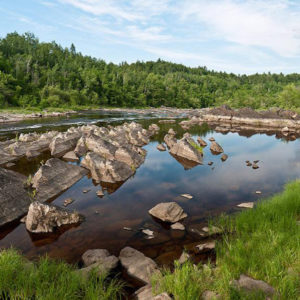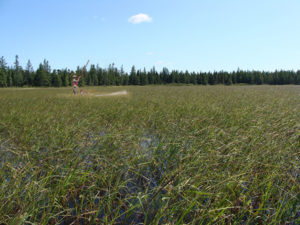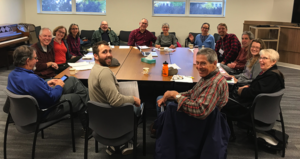Fond du Lac Band of Lake Superior Chippewa
The Fond du Lac reservation, which is one of six Chippewa Indian Reservations in Minnesota, is located in the northern part of the state and encompasses 170 square miles of land spanning Carlton and St. Louis counties. The reservation was established in 1854 by the second treaty of La Pointe, which ceded most Ojibwe (also known as Chippewa or Anishinaabe) land on the northern and western shores of Lake Superior to the U.S. government while also creating the Grand Portage and Fond du Lac reservations. The Fond du Lac band of Lake Superior Chippewa has approximately 4,200 enrolled members and the reservation contains many natural and cultural resources important to the Chippewa tribe.
The Fond du Lac Resource Management Division is dedicated to managing and conserving the resources within the Fond du Lac Reservation and treaty areas in a sustainable way and has developed resource management plans to ensure the protection and conservation of the environment. In 2016, the Fond du Lac Band partnered with the Grand Portage Band of Lake Superior Chippewa, the 1854 Treaty Authority and the Bois Forte Band of Chippewa, with support from Adaptation International and the Great Lakes Integrated Sciences and Assessments to develop a Climate Change Vulnerability Assessment and Adaptation Plan.
The purpose of the plan was to assess how the current climate crisis is impacting key species and ecosystems within the 1854 ceded territory, including the Fond du Lac, the Bois Forte and the Grand Portage reservations, predict future effects, and develop adaptation strategies. Resources, including water quality and quantity, several fish species, wetlands and wild rice, are already being impacted by climate change. The Climate Change Vulnerability Assessment and Adaptation Plan is just one example of the Fond du Lac Band’s commitment to environmental conservation, as the Fond du Lac Band also has a history of commitment to promoting energy efficiency and developing alternative sources of electricity, such as solar within the reservation.
Get involved
Now that you’ve learned more, the best way to create change is by getting involved! Donate your money or time, find support, and take action. Citizen climate action means a stronger, healthier, more vibrant Duluth!
To learn more about the Fond du Lac Band’s efforts to promote environmental sustainability visit their website and read the Climate Change Vulnerability Assessment and Adaptation Plan.





